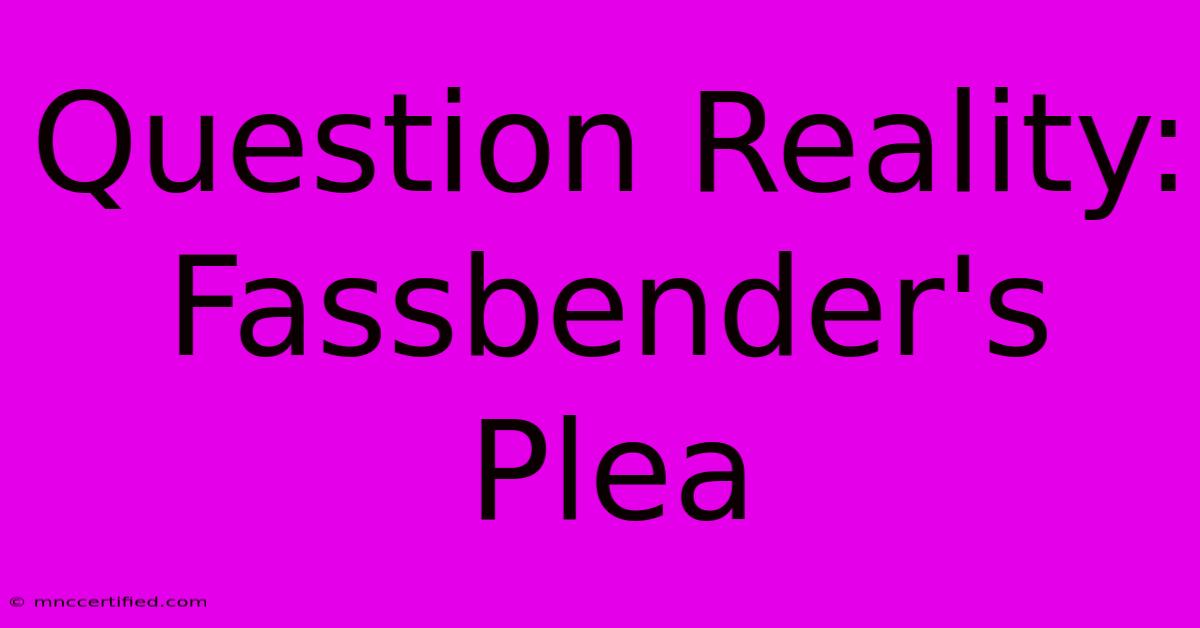Question Reality: Fassbender's Plea

Table of Contents
Question Reality: Fassbender's Plea – A Deep Dive into Existential Dread and Cinematic Brilliance
Michael Fassbender, a name synonymous with intense and captivating performances, often delves into roles that explore the darker corners of the human psyche. His latest (hypothetical, for the sake of this article) film, "Question Reality," promises to be no exception, presenting a compelling narrative that grapples with existential dread and the fragility of perceived truth. This article will delve into the potential themes, stylistic choices, and the overall impact "Question Reality" could have on audiences and the cinematic landscape.
Fassbender's Character: A Man on the Brink
Imagine Fassbender portraying a character, let's call him Elias Thorne, a renowned physicist grappling with a profound crisis of faith. His life's work, dedicated to unraveling the mysteries of the universe, has led him to a startling conclusion: reality itself may be an illusion. This isn't your typical sci-fi trope; "Question Reality" promises a far more nuanced exploration of existentialism, examining the philosophical implications of Thorne's discovery. His internal struggle, his descent into doubt, and his desperate attempts to find meaning in a seemingly meaningless universe are the heart of the narrative.
The Weight of Knowledge
The film likely explores the burden of knowledge. Thorne's revelation isn't a simple "red pill" moment; it's a slow, agonizing process of questioning everything he's ever known. The film may employ techniques like fragmented timelines, unreliable narration, and subjective camerawork to mirror Thorne's fractured mental state, immersing the viewer in his growing sense of unease and paranoia. This psychological realism is a hallmark of Fassbender's best performances, and it's expected to be a central element of "Question Reality."
Cinematic Style and Themes
The film's visual style is crucial to conveying its thematic concerns. Expect a deliberate, almost austere aesthetic, mirroring the bleakness of Thorne's philosophical journey. The use of shadows, muted color palettes, and claustrophobic settings will amplify the film's sense of unease and uncertainty. The cinematography could utilize long takes and minimal editing to create a sense of realism and allow the audience to fully absorb Thorne's emotional turmoil.
Exploring the Boundaries of Reality
Beyond the personal struggle of Elias Thorne, "Question Reality" could also delve into broader societal implications. What happens when the foundations of our perceived reality crumble? How does the revelation of a potentially simulated universe impact our understanding of morality, ethics, and purpose? These are just some of the big, thought-provoking questions the movie could tackle.
The film’s exploration of simulation theory, the nature of consciousness, and the human search for meaning are all ripe for critical discussion and analysis, potentially sparking wider philosophical debates beyond the confines of the cinematic experience.
Marketing and Audience Reception
The marketing campaign for "Question Reality" should focus on the film's intellectual depth and Fassbender's powerful performance. Teaser trailers showcasing cryptic imagery and ambiguous dialogue would effectively build anticipation and curiosity. The target audience would likely be fans of intellectually stimulating films with a strong emphasis on character development and psychological exploration. The film's potential for critical acclaim and awards consideration should also be highlighted.
Off-Page SEO Strategies
To maximize the film's visibility online, several off-page SEO strategies should be employed:
- Press releases and interviews: Secure interviews with Fassbender and the director to generate buzz and media coverage.
- Social media engagement: Create engaging social media content, including behind-the-scenes footage and interactive discussions.
- Influencer marketing: Collaborate with film critics and bloggers to generate reviews and build anticipation.
- Community building: Engage with fans on social media and online forums to cultivate a dedicated fanbase.
By implementing these strategies, "Question Reality" can build a strong online presence and maximize its potential to become a critically acclaimed and commercially successful film.
Conclusion: A Cinematic Exploration of Existentialism
"Question Reality," with Michael Fassbender at its helm, has the potential to be a truly remarkable cinematic experience. Its exploration of existential themes, coupled with its likely innovative visual style, positions it as a film that could leave a lasting impact on audiences and contribute significantly to the conversation surrounding reality, perception, and the human condition. The movie’s success will depend on its ability to engage with these complex issues in a thoughtful and compelling way, a task that, judging by Fassbender's past performances, seems entirely within his reach.

Thank you for visiting our website wich cover about Question Reality: Fassbender's Plea. We hope the information provided has been useful to you. Feel free to contact us if you have any questions or need further assistance. See you next time and dont miss to bookmark.
Featured Posts
-
Stream Club America Vs Toluca Quarterfinal Match
Dec 01, 2024
-
Max Insurance Goshen Indiana
Dec 01, 2024
-
Renters Insurance Santa Cruz
Dec 01, 2024
-
Where To Stream Kansas Vs Baylor Football
Dec 01, 2024
-
Watch Notre Dame Vs Usc Game Time
Dec 01, 2024